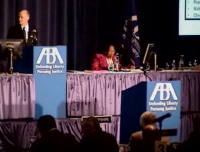ABA House to Air Live on the Web Today

Business of the House of Delegates
gets underway in Boston.
View live videocast here.
Live from Boston, it’s the ABA House of Delegates.
For the first time, the ABA’s policymaking body will webcast its sessions live from the ABA Midyear Meeting. The House session, scheduled for 8 a.m. to 5 p.m. ET today, will be available online here.
The ABA Journal’s homepage will be updated throughout the day with coverage of major resolutions that come before the House.
The 555-member House functions as the legal profession’s representative body. It is composed primarily of representatives from state and local bar associations. Established in 1936, it meets twice each year at the ABA annual and midyear meetings to debate issues of concern to the legal profession.
In what is expected to be the most passionate debate, the House will tackle a proposal to make it easier for a lawyer to move from one firm to another in a way that would allow the new firm to hang on to clients, even if the lawyer represented adverse parties at his or her old firm.
It is the second straight meeting, and the third time this decade, the issue has come before the House.
In 2002, the House rejected a proposal by the ABA’s Ethics 2000 Commission to amend Model Rule 1.10 to allow a firm to “screen” the incoming lawyer from any participation in a case that might create conflicts for clients represented by the lawyer at his or her former firm. With screening, one lawyer’s conflict of interest would not require the entire firm to be disqualified from a case, as it would be under Model Rule 1.10 in its current form.
The Standing Committee on Ethics picked up the cause in 2008, but the House tabled the measure at the 2008 annual meeting in August by a single-vote margin. The committee is bringing essentially the same recommendation back next week, and the ABA’s Section of Litigation has submitted an alternative recommendation that would permit screening only when a lawyer had no substantial involvement in or material information about the previous firm’s representation of the new firm’s adverse client.
Those two resolutions, Nos. 109 and 110, are scheduled to be debated beginning at 1:45 p.m. ET. All House resolutions, along with other background information about the session, are available here.
Other scheduled events during the House session include:
9:30 a.m.: Statement by ABA President H. Thomas Wells, Jr.
11 a.m.: Remarks by Walter E. Dellinger III, former U.S. Solicitor General, on “America’s Greatest Lawyer—Abraham Lincoln in Private Practice and Public Life”
11:45 am: Remarks by Chief Justice Margaret Marshall, president of the Conference of Chief Justices and 23rd Justice of Massachusetts Supreme Judicial Court
1:30 p.m.: Statements by ABA Treasurer Alice E. Richmond and ABA Executive Director Henry F. White Jr.
After Reports 109 and 110: Statement by President-elect Nominee Stephen N. Zack
Other resolutions on the House calendar, none of which have a scheduled time for debate, include:
• A recommendation that the ABA support legislation and policy that would enable a U.S. citizen or permanent resident who shares a mutual, interdependent and committed relationship with a noncitizen of the same sex to sponsor that person for permanent residence in the United States. The Section of Individual Rights and Responsibilities is joined by eight co-sponsors in supporting the measure.
• A proposal that the procedural framework for Guantanamo Bay detainees be determined by federal district courts, not Congress, and that the courts grant detainees all rights of habeas petitioners.
• A recommendation that Congress and state legislatures revise laws and other policies that require youths to register as sex offenders or be subject to community notice provisions under the same rules as adults. The recommendation also calls for Congress and the states to give juvenile court judges sole discretion to decide what restrictions or reporting requirements should be imposed on youthful sex offenders.
• A series of recommendations intended to bolster the response of the insurance industry to widespread damage caused by hurricanes and other storms. In particular, the recommendations are aimed at halting the departure of private insurance companies from areas in the Southeast and along the East Coast where most hurricanes occur, and to reduce the amount of litigation between insurers and property owners on the specific causes of damage giving rise to claims.
Write a letter to the editor, share a story tip or update, or report an error.


